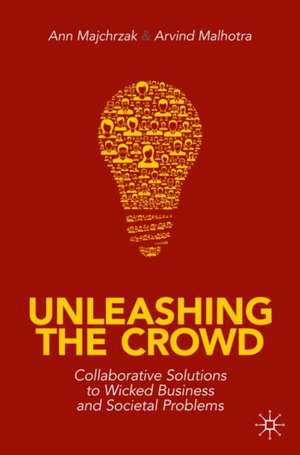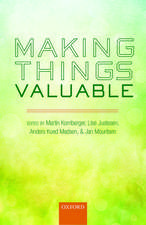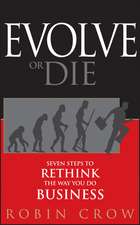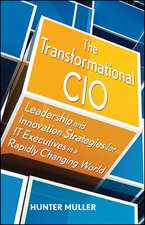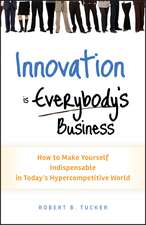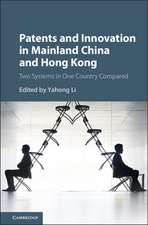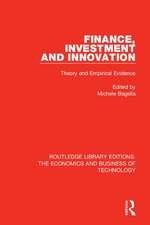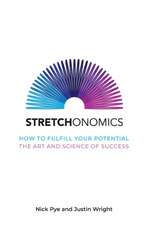Unleashing the Crowd: Collaborative Solutions to Wicked Business and Societal Problems
Autor Ann Majchrzak, Arvind Malhotraen Limba Engleză Paperback – 12 noi 2019
Preț: 214.86 lei
Nou
41.12€ • 42.77$ • 33.95£
Carte disponibilă
Livrare economică 24 martie-07 aprilie
Specificații
ISBN-10: 3030255565
Pagini: 308
Ilustrații: XXIX, 302 p. 34 illus.
Dimensiuni: 155 x 235 mm
Greutate: 0.47 kg
Ediția:1st ed. 2020
Editura: Springer International Publishing
Colecția Palgrave Macmillan
Locul publicării:Cham, Switzerland
Cuprins
SECTION I: INTRODUCTION
Chapter 1: What is Crowdsourcing for Innovation?
Chapter 2. Our Research on Comparing Idea Sharing
SECTION II: HOW DO CROWDS INNOVATE?
Chapter 3. Practice #1: Minimally Committed Knowledge Baton Passers
Chapter 4: Practice #2: Crowds Offering a Variety of Types of Knowledge Are
More Innovative Than Crowds Suggesting More Ideas
Chapter 5: Practice #3: Amplify Creative Associations of Knowledge
Fragments
Chapter 6: Practice #4: Reconstructing Needs for Creative Associations
Chapter 7: Practice #5: Allowing the Crowd to Play Any Innovation-Enabling They Choose
Section III: WHAT’S NEXT: IMPLICATIONS FOR RESEARCH, TECHNOLOGY PLATFORMS, AND MANAGERS
CHAPTER 8: Tying it All Together: A Theory of Collective Production of Innovation to Inspire Future Research
Chapter 9: Designing Technology Platforms for Collective Co-Proudction: Advice When Selecting Crowdsourcing Platforms
Chapter 10: Unleashing the Crowd: Overcoming the Managerial Challenges
Chapter 11: FINAL WORDS: WHAT’S THE FUTURE: Managing Organizations as Crowds Enabled by Super-Connectivity and Big Data
Recenzii
Notă biografică
Ann Majchrzak is Chaired Professor of Business Administration and Digital Innovation at the Marshall School of Business, University of Southern California, USA. She is an internationally-known scholar in the fields of management, organization science, and information systems, as well as publishing in top practitioner journals. This is her fourth book.
Arvind Malhotra is H. Allen Andrews Professor of Entrepreneurial Education and Professor of Strategy and Entrepreneurship at the Kenan-Flagler School of Business, University of North Carolina, Chapel Hill, USA. He is an expert on innovation processes, inter-organizational knowledge management, and virtual teams having published in many top-tier academic and practice oriented journals.
Textul de pe ultima copertă
This book disrupts the way practitioners and academic scholars think about crowds, crowdsourcing, innovation, and new organizational forms in this emerging period of ubiquitous access to the internet. The authors argue that the current approach to crowdsourcing unnecessarily limits the crowd to offering ideas, locking out those of us with knowledge about a problem. They use data from 25 case studies of flash crowds — anonymous strangers answering online announcements to participate in a 7-10 day innovation challenge — half of whom were unleashed from the limitations of focusing on ideas. Yet, these crowds were able to develop new business models, new product lines, and offer useful solutions to global problems in fields as diverse as health care insurance, software development, and societal change. This book, which offers a theory of collective production of innovative solutions explaining the practices that the crowds organically followed, will revolutionize current assumptions about how innovation and crowdsourcing should be managed for commercial as well as societal purposes.
Caracteristici
Descriere
This book disrupts the way practitioners and academic scholars think about crowds, crowdsourcing, innovation, and new organizational forms in this emerging period of ubiquitous access to the internet. The authors argue that the current approach to crowdsourcing unnecessarily limits the crowd to offering ideas, locking out those of us with knowledge about a problem. They use data from 25 case studies of flash crowds — anonymous strangers answering online announcements to participate in a 7-10 day innovation challenge — half of whom were unleashed from the limitations of focusing on ideas. Yet, these crowds were able to develop new business models, new product lines, and offer useful solutions to global problems in fields as diverse as health care insurance, software development, and societal change. This book, which offers a theory of collective production of innovative solutions explaining the practices that the crowds organically followed, will revolutionize current assumptions about how innovation and crowdsourcing should be managed for commercial as well as societal purposes.
